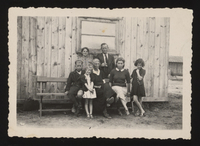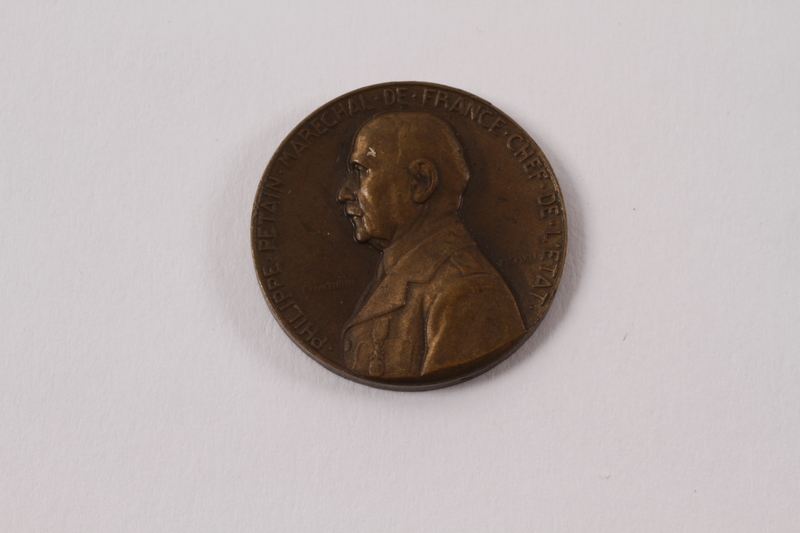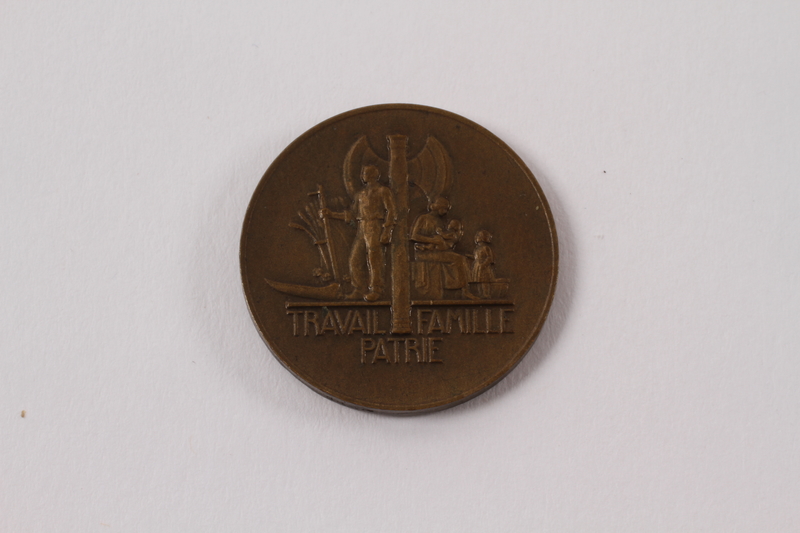Overview
- Brief Narrative
- Small, bronze Marshal Petain medal given to 11 year old Renee Kann, a German Jewish refugee from Saarbrucken, Germany, for being a good student at a school in Vichy France circa fall 1940 to June 1942. Renee’s family left Saarland after its 1935 reunification with Germany and settled in France. On May 10, 1940, Germany invaded France, and 7 days later, Renee’s family was arrested by French authorities as enemy aliens. They were sent to Gurs internment camp in southwestern France. On August 14, the family was released and settled in Villeurbanne, Vichy France. In June 1942, Friedel sent Renee and Edith into hiding in Le Chambon sur Lignon. In late September, the family paid a guide to help them escape over the Swiss border. Renee’s family reached Basel, Switzerland on October 3, where they remained until the end of the war. On July 10, 1947, they left for the US.
- Date
-
received:
approximately 1942
issue: after 1940-before 1946
- Geography
-
received:
Villeurbanne (France)
issue: Vichy (France)
- Credit Line
- United States Holocaust Memorial Museum Collection, Gift of Renee Kann Silver
- Markings
- front, border, embossed : •PHILIPPE•PETAIN•MARECHAL•DE•FRANCE•CHEF•DE•L'ETAT• [Philippe Petain, Marshall of France, Head of State]
front, left of figure, embossed : PIERRE TURIN
front, right of figure, embossed : MCMXLI [1941]
rim, engraved : (KO?)PP
back, below image, embossed : TRAVAIL FAMILLE / PATRIE [Work Family / Country] - Contributor
-
Subject:
Renee Silver
Designer: Pierre Turin
- Biography
-
Ruth Renee Kann was born on February 24, 1931, in Saarbrucken, Germany, to Edmund and Friedrike (Friedel) Klaber Kann. Edmund was born on May 29, 1894, in Windsheim, Germany, to a Jewish couple, Frederique Blum Kann and her husband. Edmund had two older brothers, Nathan (1886-1964) and Ernst. He served in the German Army during the First World War amd was seriously injured and partially paralyzed on his left side. Friedel was born on December 29, 1904, in Zulpich, Germany, to August and Paula Cahn Klaber. Friedel had 3 siblings, Joseph, Else, and Felix. Their father was an artist specializing in glasswork, with his own shop. On February 23, 1930, Edmund and Friedel married and settled in Saarbrucken, in Saarland, which was under French control following a mandate imposed by the Versailles Treaty that ended World War I. Edmund opened a scrap metal business. Renee’s sister, Edith, was born on July 28, 1933.
On January 30, 1933, Adolf Hitler was appointed Chancellor of Germany. On January 1, 1935, a plebiscite in Saarland approved reunification with Germany. Because of Germany's anti-Jewish decrees, Edmund decided the family would leave. He sold his business and they moved across the border to Sarreguemines, France. During the November 1938, Kristallnacht pogrom in Germany, Renee’s uncles, Nathan and Ernst Kann, were arrested and interned in Dachau concentration camp. Nathan had a visa for the United States, so he was released, but Ernst remained at Dachau. In January 1939, Nathan and his family left for the US. Renee’s cousins Lucie and Leon Kann and her grandmother Frederique Blum Kann joined her family in France. Renee’s uncle Joseph Klaber and aunt Else Klaber left to join their brother Felix in Sao Paulo, Brazil. In September 1939, around the time Germany invaded Poland, Renee’s family moved away from the German border and settled in Longeville-en-Barrois. They pretended to be Christians by enrolling Renee and Edith at Catholic schools and attending daily mass.
In spring 1940, Edmund, a German war veteran, was arrested as a possible threat. He produced a medical certificate that confirmed he was disabled, thus not a threat, and was released. On May 10, Germany invaded France. On May 17, the Kann family was arrested by the French as enemy aliens. They were jailed in the nearby town of Bar-le-Duc and then transferred to Gurs internment camp in southwestern France. Edmund’s disability qualified him to live in the barracks for sick inmates, where the family received better treatment. While in the camp, Renee and Edith spent a lot of time with the other prisoners, which included Romanies and political refugees. In June, Renee’s family was given the choice to be repatriated to Germany, but refused. On June 23, France surrendered to Germany and signed an armistice. Germany occupied the northwestern regions of France. The southeastern regions were governed by the newly formed French government at Vichy, which collaborated with Germany. On August 14, Renee and her family were released from Gurs. They travelled north to Toulouse, still in Vichy France. Renee’s grandmother Frederique and her cousins escaped to the US. Renee’s family went to Lyon, where her father had a friend, Ramon Levy, who helped them find an apartment in the nearby Villeurbanne. Renee and Edith enrolled at a local school. In June 1942, the directress at Renee’s school announced that she would have won a particular prize, but that it was given to another child because Renee was Jewish. This announcement prompted Friedel to send Renee and Edith into hiding. She took them to a woman named Madame Dreyfus, who arranged for the sisters to be taken to the nearby mountain town of Le Chambon sur Ligne, where many French families were hiding Jewish refugees. The sisters were housed by different families, Renee with the Fourniers and Edith with the Chaputs, but were occasionally able to visit one another. Renee was lonely and unhappy, so one day she left and got Edith. They made their way back to Villeurbanne to find their parents. When they arrived at their apartment, Friedel and Edmund were gone. The sisters burst into tears and the family next door heard them crying. They told the girls that the Caussidiere family had hidden their parents at a local theater to keep them from being deported by the Vichy French authorities. Madame Dreyfus took the girls back to Le Chambon. Edith returned to the Chaputs and Renee was placed in a boarding house for girls. In late September, Renee’s parents felt the situation for Jews in Vichy France was getting worse, and decided to flee. They called Renee and Edith back to Villeurbanne and told them that they were now the Weber family. The girls were allowed to keep their first names, but Edmund was now Louis Pierre and Friedel was Marie Cecile Catherine. Edmund hired a guide to take them over the Swiss border illegally. The guide tried to extort more money from Renee’s parents, and then left the family in a farm field. On October 3, the Kann family reached Basel and was arrested the next day. They would have been sent to a Swiss internment camp, but both Renee and Edith had hepatitis and had to be hospitalized. The family stayed in Basel, and Edmund and Friedel had to report to the authorities once a week.
On May 7, 1945, Germany surrendered. Renee’s family returned to Sarreguemines. While Renee and Edith attended school, their parents prepared to emigrate to the United States. Friedel began calling herself Frieda. On July 10, 1947, the family sailed to New York City, then settled in Pittsburgh, Pennsylvania, near Edmund’s brother Nathan. They learned that most of their extended family members had been deported to concentration camps, including Theresienstadt and Dachau. Most had died in September 1942, during a forced march to Treblinka killing center in German-occupied Poland. Her uncle Ernst had died at Dachau, supposedly of pneumonia. Renee attended one year of high school before attending the University of Pittsburgh to study foreign languages. At the university, Renee met Arthur Silver (1926-2010). The couple married in November 1950 and settled in New York City. Renee worked as a foreign language teacher for high schoolers and her husband worked at a local university. They had one son. Edmund, 85, died on December 28, 1979. Frieda, 79, died on June 17, 1984. Edith, 64, passed away on May 1, 2008. Renee regularly speaks to groups about her experiences during the Holocaust and has written about them extensively.
Physical Details
- Language
- French
- Classification
-
Awards
- Category
-
Medals
- Object Type
-
Portrait medallions (lcsh)
- Physical Description
- Small, circular, embossed, bronze colored medal with a detailed relief of Marshal Petain, a balding older man in left profile, from the chest up, wearing a military uniform jacket with a medal. There is French text around the edge. The back has a relief of a family, with a man holding a scythe standing to the left of a woman seated with 2 children, one in her lap and another beside her. The figures are arranged around the pole of a large, 2 headed axe with curved blades, the symbolic badge of Petain. Below the image is a 3 word slogan.
- Dimensions
- overall: | Diameter: 0.750 inches (1.905 cm)
- Materials
- overall : metal
Rights & Restrictions
- Conditions on Access
- No restrictions on access
- Conditions on Use
- No restrictions on use
Keywords & Subjects
- Topical Term
- Hidden children (Holocaust)--France--Biography. Holocaust, Jewish (1939-1945)--France--Personal narratives, Jewish. Holocaust, Jewish (1939-1945)--Switzerland--Personal narratives, Jewish. Jewish children in the Holocaust--France--Biography. Jewish refugees--Switzerland--Biography. World War, 1939-1945--Refugees--Switzerland--Personal narratives. World War, 1939-1945--Prisoners and prisons, French.
Administrative Notes
- Legal Status
- Permanent Collection
- Provenance
- The medal was donated to the United States Holocaust Memorial Museum in 2013 by Renee Kann Silver.
- Funding Note
- The cataloging of this artifact has been supported by a grant from the Conference on Jewish Material Claims Against Germany.
- Record last modified:
- 2023-08-29 13:06:26
- This page:
- https://collections.ushmm.org/search/catalog/irn87454
Download & Licensing
In-Person Research
- By Appointment
- Request 21 Days in Advance of Visit
- Plan a Research Visit
- Request to See This Object
Contact Us
Also in Renee Kann Silver family collection
The collection consists of a camera with case, a medal, documents, oral testimony, and photographs related to the experiences of Renee Kann (later Silver), her parents, Edmund and Friedel Klaber Kann, and her sister, Edith (later Roth) in Germany and France before the war, in France and Switzerland, including their imprisonment in Gurs internment camp, during the war, and in Switzerland, France, and the United States after the war.
Date: 1930-2010

Kann family papers
Document
The Kann family papers include biographical material, correspondence, subject files, and photographs relating to Edmond, Friederike, Renée, and Edith Kann’s pre-war, wartime, and post-war experiences in Saarbrücken, Germany, Gurs concentration camp, and France. The collection includes documents and photographs relating to their imprisonment in Gurs, false identity cards, and postcards sent to Renée and Edith while they were in Le Chambon-sur-Lignon. The collection also includes a memoir written by Edmond Kann documenting his family’s experiences. Biographical material includes a Reisepass (German passport), false identity documents, and a United States passport for Edmond and Friederike Kann as well as post-war French travel visas for Edmond, Friederike, and Edith. The series also includes naturalization papers and marriage confirmation for Edmond and Friederike’s, a copy of Edmond’s birth certificate, and a family history book. Edmond’s memoir, entitled, “Ein Hitler Schicksal” consists of three notebooks recollecting the family’s experiences from 1935-1947 including fleeing to France, their imprisonment in Gurs, going into hiding, and immigrating to the United States. Also included in this series is an English translation provided by Renée Kann. Subject files include release papers from Gurs, a tax notice, a poem, a transcript of Edmond Kann’s oral testimony, and a letter which accompanied the Marshal Petain medal Renée received while in school. This series also includes correspondence sent to Renée and Edith while they were in Le Chambon-surLignon. Photographs (original and photocopies) and negatives depict the Kann family in Windesheim, Germany before the war and in Gurs. Five negatives have been removed from the collection and placed in cold storage. Prints of the negative are included in this series.
Oral testimony of Edmund Kann
Oral History
Voigtlander Bessa camera and case used by a German Jewish family while imprisoned in Gurs
Object
Voigtlander Bessa self-erecting camera and fitted leather case used by Renee, Edith, Edmund, and Friedel Kann, a German Jewish refugee family from Saarbrucken, Germany, while they were imprisoned in Gurs internment camp in Vichy France from May to August 1940. Renee’s family left Saarland after its 1935 reunification with Germany and settled in France. On May 10, 1940, Germany invaded France, and 7 days later, Renee’s family was arrested by French authorities as enemy aliens. They were sent to Gurs internment camp in southwestern France. On August 14, the family was released and settled in Villeurbanne, Vichy France. In June 1942, Friedel sent Renee and Edith into hiding in Le Chambon sur Lignon. In late September, the family paid a guide to help them escape over the Swiss border. Renee’s family reached Basel, Switzerland on October 3, where they remained until the end of the war. On July 10, 1947, they left for the US.





